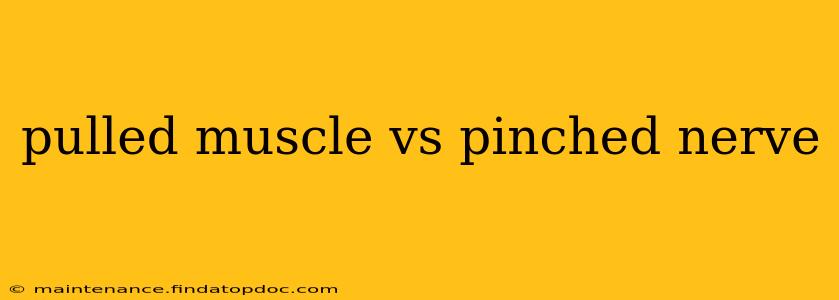Experiencing pain in your back, neck, or limbs can be debilitating. Two common culprits are pulled muscles and pinched nerves. While both cause discomfort and limit movement, they stem from different underlying issues and require different approaches to treatment. This article will clarify the key differences between a pulled muscle (muscle strain) and a pinched nerve (nerve compression), helping you better understand your pain and seek appropriate care.
What is a Pulled Muscle (Muscle Strain)?
A pulled muscle, more accurately termed a muscle strain, occurs when muscle fibers are overstretched or torn. This typically happens due to sudden, forceful movements, overuse, or inadequate warm-up before physical activity. The severity of a strain can range from mild discomfort to a complete tear of the muscle.
Symptoms of a Pulled Muscle:
- Pain: Localized pain at the site of the injury, often worsening with movement.
- Muscle spasms: Involuntary muscle contractions.
- Swelling: Inflammation around the affected area.
- Bruising: Discoloration of the skin.
- Limited range of motion: Difficulty moving the affected muscle.
- Weakness: Reduced strength in the affected muscle.
What is a Pinched Nerve (Nerve Compression)?
A pinched nerve, or nerve compression, happens when pressure is placed on a nerve, interfering with its ability to send signals. This pressure can result from various factors, including:
- Herniated disc: A ruptured intervertebral disc in the spine can press on nearby nerves.
- Bone spurs: Abnormal bone growths that can impinge on nerves.
- Swelling: Inflammation from injuries or conditions like arthritis can compress nerves.
- Tumors: Growths can put pressure on nerves.
- Repetitive movements: Constant strain on a nerve from repetitive actions.
Symptoms of a Pinched Nerve:
- Pain: Pain can radiate along the nerve's pathway (radiculopathy), often described as shooting, burning, or tingling.
- Numbness: Loss of sensation in the area supplied by the affected nerve.
- Tingling: Pins and needles sensation.
- Weakness: Muscle weakness in the area supplied by the pinched nerve.
- Loss of reflexes: Diminished or absent reflexes.
What are the Key Differences Between a Pulled Muscle and a Pinched Nerve?
The key differences lie in the source of the pain and the nature of the symptoms:
| Feature | Pulled Muscle (Strain) | Pinched Nerve (Compression) |
|---|---|---|
| Cause | Overstretched or torn muscle fibers | Pressure on a nerve |
| Pain Location | Localized to the injured muscle | Radiates along the nerve's pathway |
| Pain Type | Aching, soreness, cramping | Shooting, burning, tingling, electric shock-like |
| Numbness/Tingling | Usually absent | Often present |
| Weakness | May be present, usually localized | May be present, often affects specific muscles |
How are Pulled Muscles and Pinched Nerves Diagnosed?
Diagnosis usually involves a physical examination by a doctor or physical therapist. They will assess your range of motion, muscle strength, reflexes, and sensory function. Imaging tests such as X-rays, MRIs, or CT scans may be necessary to rule out more serious conditions like herniated discs or bone spurs, especially when dealing with suspected pinched nerves.
How are Pulled Muscles and Pinched Nerves Treated?
Treatment strategies vary depending on the severity of the condition and the individual’s overall health.
Pulled Muscle Treatment:
- Rest: Avoid activities that aggravate the injury.
- Ice: Apply ice packs to reduce swelling and pain.
- Compression: Use a bandage to provide support.
- Elevation: Keep the injured area elevated to minimize swelling.
- Over-the-counter pain relievers: Ibuprofen or acetaminophen can help manage pain and inflammation.
- Physical therapy: Exercises to strengthen and stretch the muscle.
Pinched Nerve Treatment:
- Rest: Avoid activities that aggravate the symptoms.
- Ice or heat: Experiment to see which provides more relief.
- Over-the-counter pain relievers: NSAIDs or acetaminophen may help.
- Physical therapy: Exercises and stretches to improve posture and reduce nerve compression.
- Medications: In some cases, stronger pain relievers, muscle relaxants, or anti-inflammatory drugs may be prescribed.
- Injections: Corticosteroid injections can reduce inflammation around the nerve.
- Surgery: In rare cases, surgery may be necessary to relieve pressure on the nerve.
Can a Pulled Muscle Cause a Pinched Nerve?
While not directly causative, a severely pulled muscle or muscle spasm can indirectly contribute to nerve compression by creating swelling or altering the anatomical position of surrounding structures, potentially leading to a pinched nerve.
When Should I See a Doctor?
Seek medical attention if:
- Your pain is severe or doesn't improve after a few days of home treatment.
- You experience numbness, tingling, or weakness.
- You have difficulty moving the affected area.
- Your pain radiates down your arm or leg.
This information is for general knowledge and should not be considered medical advice. Always consult a healthcare professional for diagnosis and treatment of any medical condition.
